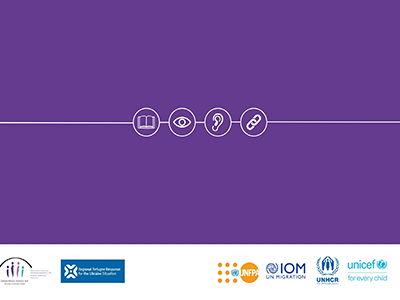Cover image: © UNICEF/UN
This e-learning course aims to strengthen the skills of humanitarian workers who are not specialized on gender-based violence (GBV) responses, in providing initial support to survivors of GBV, with a focus on migrant and refugee survivors and displaced people with diverse backgrounds. The course also offers humanitarian workers with useful information on available GBV specialised services.
The e-learning course was developed based on the inter-agency pocket guide “How to support survivors of GBV when a GBV actor is not available in your area”.
Learning objectives
- Strengthen the skills of humanitarian workers that are not specialized on GBV response, in providing initial support to survivors of gender-based violence, with a focus on migrant and refugee survivors and displaced people with diverse backgrounds.
- Offer humanitarian workers useful information on available GBV specialised services.
- At the end fo the course, participants will be able to:
- Recognise the definition of GBV.
- Understand the dynamics of GBV affecting people during emergency situation such as conflict, natural disasters, and forced displacement.
- Identify the GBV guiding principles, link the principles with their description and understand how to use them
- Recognise the definition and importance of psychological first aid (PFA) in situations of GBV and connect each phase to its description
- Recognise the guiding principles, responsibilities and limitations of supporting child survivors of violence.
Audience
Humanitarian workers who are not specialized on GBV response.
Length
120 minutes.
Methodology
The course was developed as an adaptation to the European context based on the inter-agency Pocket Guide, “How to support survivors of gender-based violence when a GBV actor is not available in your area”. It includes text, video and quiz functions and has received input from UNICEF, UNHCR, IOM and UNFPA
Structure
The course includes 1 introductory module (Module 0), followed by four substantive learning Modules, each followed by an interactive case study. A final graded assessment marks the end of the test. Participants must score 80% or above to attain the course completion certificate.
Module 0: Welcome to the Course
Module 1: Introduction to gender-based violence - Definitions, causes, types and consequences of GBV.
- Interactive Case Study
- Interactive Case Study
- Interactive Case Study
- Interactive Case Study
Certificate
Contact details
Content issues and questions: Maria Margherita Maglietti (mmaglietti@unicef.org) and Meghan Ingram (mingram@unicef.org)
Course and learner management: Maria Margherita Maglietti (mmaglietti@unicef.org) and Meghan Ingram (mingram@unicef.org)
